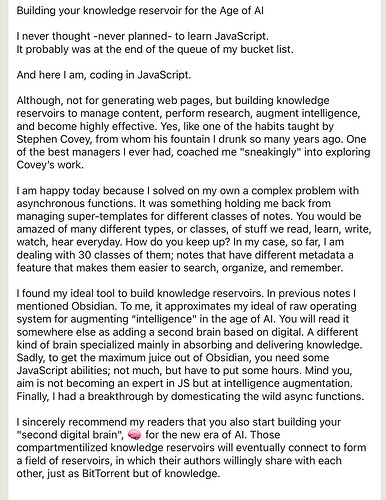This is something I wrote in LinkedIn today.
This express every time I get into my computer to work with Obsidian.
Building your knowledge reservoir for the Age of AI
I never thought -never planned- to learn JavaScript.
It probably was at the end of the queue of my bucket list.
And here I am, coding in JavaScript.
Although, not for generating web pages, but building knowledge reservoirs to manage content, perform research, augment intelligence, and become highly effective. Yes, like one of the habits taught by Stephen Covey, from whom his fountain I drunk so many years ago. One of the best managers I ever had, coached me “sneakingly” into exploring Covey’s work.
I am happy today because I solved on my own a complex problem with asynchronous functions. It was something holding me back from managing super-templates for different classes of notes. You would be amazed of many different types, or classes, of stuff we read, learn, write, watch, hear everyday. How do you keep up? In my case, so far, I am dealing with 30 classes of them; notes that have different metadata a feature that makes them easier to search, organize, and remember.
I found my ideal tool to build knowledge reservoirs. In previous notes I mentioned Obsidian. To me, it approximates my ideal of raw operating system for augmenting “intelligence" in the age of AI. You will read it somewhere else as adding a second brain based on digital. A different kind of brain specialized mainly in absorbing and delivering knowledge. Sadly, to get the maximum juice out of Obsidian, you need some JavaScript abilities; not much, but have to put some hours. Mind you, aim is not becoming an expert in JS but at intelligence augmentation. Finally, I had a breakthrough by domesticating the wild async functions.
I sincerely recommend my readers that you also start building your “second digital brain”, ![]() for the new era of AI. Those compartmentalized knowledge reservoirs will eventually connect to form a field of reservoirs, in which their authors willingly share with each other, just as BitTorrent but of knowledge.
for the new era of AI. Those compartmentalized knowledge reservoirs will eventually connect to form a field of reservoirs, in which their authors willingly share with each other, just as BitTorrent but of knowledge.
